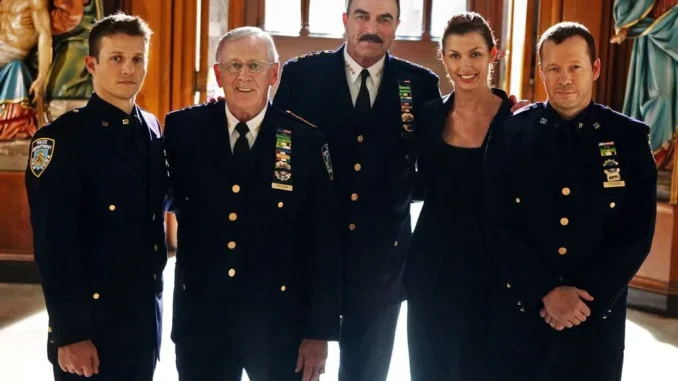
Even after the series finale aired, many fans are still asking why Blue Bloods was canceled. And they’re not wrong to wonder just why CBS ended the run of one of its most successful shows after 14 seasons.
After all, the police procedural was one of the most popular shows in the network’s lineup: since premiering in 2010, Blue Bloods had been the top-rated primetime network series on Friday nights, and, according to Deadline, each episode pulled in 11 million viewers between CBS and Paramount+.
Tom Selleck, the Magnum, P.I. TV legend who served as executive producer and starred as Frank Reagan, the Commissioner of the NYPD and the patriarch of the show’s central family, made no secret of his frustration with the fate of Blue Bloods. He articulated the feelings of many, many fans, telling TV Line, “My frustration is the show was always taken for granted because it performed from the get-go.”
Shortly after the show was officially canceled, Selleck summed it up to CBS News, saying,
We’re the third-highest scripted show in all of broadcast. We’re winning the night. All the cast wants to come back. And I can tell you this: we aren’t sliding off down a cliff. We’re doing good shows, and still holding our place. So, I don’t know. You tell me!
The big question fans and Selleck were both asking does have an answer, but the reason Blue Blood ended in December 2024 isn’t quite as simple as CBS has suggested.
According To CBS, “All Shows Have To Come To An End”
Selleck wasn’t alone in his confusion or frustration. Much of the cast, which also includes Bridget Moynahan and Donnie Wahlberg, were vocal about wanting to continue into Season 15.
At a press conference in May 2024, CBS Entertainment President Amy Reisenbach explained that it was simply the end of the road for one of the network’s longest running shows, despite the vocal passion of the cast and showrunner Kevin Wade.
Reisenbach told reporters,
We love this cast, we love their passion for the show. All shows have to come to an end. It’s important to us to refresh the schedule. We are going to end the show come December. We really want to thank the cast and crew, everyone involved in the show. We absolutely will miss the family dinners. It is important to give show the sendoff it deserves.
She remained consistent when asked about cancelations of established, popular shows like Blue Bloods and Young Sheldon in a Deadline interview, saying,
I’ll speak as a TV fan first, which is I hate when we don’t get to give shows proper endings. And I think that also speaks to our feeling of, let’s try to plan long-term as much as we can. It is a function of having a really strong schedule that we have to refresh and that means in order to refresh, shows have to eventually end.
Our goal is to always end them respectfully so that the audience gets the ending that they absolutely deserve because they’ve put in the time and they love these characters, as well as the cast and crews and writers.
The Actual Reason Season 15 Didn’t Happen Was Purely Financial
While the idea that it was simply time for Blue Bloods to ride off into the sunset is appealing and – to an extent – true enough, that explanation ignores some financial realities behind the controversial decision to close the book on the Reason family.
Specifically, it skims over behind-the-scenes negotiations from the previous season. A series as successful and lengthy as Blue Bloods becomes more expensive to produce as it goes along, with both stars and creative figures receiving bigger sums over time. In order to go ahead with Season 14, Deadline reported that CBS negotiated cost cuts of up to 25% with the cast and key creative figures in order to keep the show going and preserve jobs for the hundred of crew members who worked on the show each year.
It was only after the folks behind the series agreed to these budgetary cuts that Blue Bloods received an order for Season 14. And CBS then emphasized that Season 14, which was divided into two parts, would be the last.
Nonetheless, ratings remained strong enough that many fans, and seemingly much of the cast, hoped another round of re-negotiations would lead to at least one more season. It’s not an unreasonable hope, especially considering that S.W.A.T., which is also part of the network’s Friday night lineup, was dramatically canceled then instead brought back two seasons in a row.
‘Blue Bloods’ Fell Victim To Larger Economic Trends In TV
Some have speculated that Blue Bloods ended because its emphasis on straightforwardly heroic law enforcement was out of step with the cultural conversation around modern policing. According to such speculation, CBS axed Blue Bloods because a show about a cop family with traditional Catholic values could be accused of acting as “copaganda.”
That’s not the case. As tempting as it may be to fit this all into a the context of an ongoing, co-ordinated culture war, any such argument is hogwash.
Such a flimsy and contradictory explanation ignore the economic trends impacting not just Blue Bloods, but many other highly-rated and long-running network shows. In addition to this show about New York’s finest, CBS said so long to Young Sheldon after seven very successful seasons and waffled repeatedly on S.W.A.T., while ABC did the same with The Good Doctor. Why? To save money.
Even the most popular hourlong dramas are still far more expensive to produce than reality shows, so networks’ priority is shifting to cheaper-to-produce reality series. Even if the reality programming that takes the place of Blue Bloods can’t match the drama’s ratings, it’s likely to be be so inexpensive in comparison that the profit margins will be bigger.
